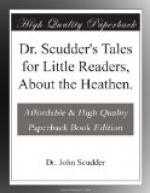The Hindoos consider themselves to be unclean if they have assisted at a funeral. When the ceremony is over, they immediately plunge into water for the sake of purification. Even the news of the death of a relative, a hundred miles off, has the same effect. The person who hears such news is considered unclean until he has bathed. In unison with this feeling, a person is no sooner dead, than he is hastened away to be buried or burned; for, until this is done, those in the house can neither eat nor drink, nor go on with their occupations.
A Brahmin who is particular in his delicacy, must be careful what he treads upon. He is obliged to wash his body or bathe, if he happens to tread on a bone, or a broken pot, a bit of rag, or a leaf from which one has been eating. He must also be careful where he sits down. Some devotees always carry their seats with them, that is, a tiger or antelope’s skin, which are always held pure. Some are contented with a mat. They may sit down on the ground without defilement, provided it has been newly rubbed over with cow-dung. This last specific is used daily to purify their houses from the defilement occasioned by comers, and goers. When thus applied, diluted with water, it has unquestionably one good effect. It completely destroys the fleas and other insects, with which they are very much annoyed.
There is one thing more which I wish to mention. It is, that all the high castes consider the use of intoxicating drinks to be defiling. I hope that you, my dear children, will always have the same opinion, and never touch them any sooner than you would touch arsenic or other poisons.
A person may be restored to his caste, provided he has not committed an unpardonable offence. This is done as follows. After he has gained the consent of his relations to be restored he prostrates himself very humbly before them, they being assembled for that purpose, and submits to the blows or other punishment which they may think proper to inflict, or pays the fine which they may have laid upon him. Then, after shedding tears of sorrow, and making promises that, by his future conduct, he will wipe away the stain of his expulsion from caste, he makes the shaashtaangkum before the assembly. This being done, he is declared fit to be restored to his tribe.
When a man has been expelled from his caste for some great offence, those who restore him sometimes slightly burn his tongue with a piece of gold made hot. They likewise apply to different parts of the body redhot iron stamps, which leave marks that remain for ever. Sometimes they compel the offender to walk on burning embers; and to complete the purification, he must drink the punchakaryam, which literally means the five things; these all come from the cow, and must be mixed together. The first three of these I will mention, namely, the milk, butter, and curds. The other two, for the sake of delicacy, I must not mention. After the ceremony of punchakaryam is finished the person who has been expelled from his caste must give a grand feast. This finishes all he has to do, and he is then restored to favor.




